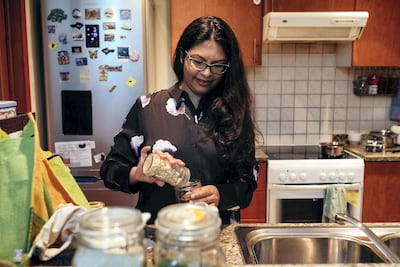Amruta Kshemkalyani used to argue with supermarket employees on a fairly regular basis.
And it was always about the same thing — her containers.
Mrs Kshemkalyani, who works as a sustainability consultant in Dubai, started living a zero waste lifestyle three years ago.

“I don't claim that I have achieved zero waste completely, but I have significantly reduced waste. And I am still targeting zero waste,” she says.
“I use as many ingredients from kitchen or food scraps for beauty and personal care as I can for making scrubs, shampoo and so on. I still buy a few things like toothpaste, but I always try to find more natural or sustainable alternative.”

And aspiring to a zero waste lifestyle inevitably means avoiding plastic containers supermarkets provide for produce. She brings her own jars, as well as bags each time she does a supermarket shop.
"At the start I had to educate people a lot," says the mother of one who runs a blog on her sustainable lifestyle.
“Now they see me and they know to weigh the empty jar first so I can add whatever I need to add — lentils, nuts, cheese.”
Her regular supermarkets now know the drill, but occasionally new employees result in old discussions. And there are still some coffee shops who refuse to serve her using her own containers.
“So then I abandon that and I go to the places where they are ready to give me it in my containers,” says Mrs Kshemkalyani, who has been working in the industry since 2009.
The bags are ‘OXO biodegradable’ which means they degrade faster than other alternatives and do so naturally, ie they degrade through exposure to oxidation and without need for a biological process. The company additionally sells re-usable eco-bags in different sizes at each cash till."
The spokesperson added that the company is investing heavily in areas to reduce its environmental impact, including in new business management systems to reduce its energy consumption.
A growing population across the UAE has led to an increasing problem with waste.
In 2016, 9.675 million tons of solid waste was generated by Abu Dhabi residents, while Dubai produces close to 8,000 tonnes of waste a day, about 70 per cent to 75 per cent is generated by the private sector.
And around $4 billion of leftover food is being thrown into the rubbish by UAE homes, restaurants and events every year, which equates to around 3.27 million tonnes in total, according to a Masdar Institute Report from 2015.
The government has introduced a series of measures to reduce the amount of waste going to landfill, including an initiative in Dubai to introduce charges based on the weight of the waste starting from next month.
But a number of companies in the UAE are also trying to help companies and residents live more sustainably.
A couple of years ago, Emvees Waste Water Treatment, a Dubai-based company, teamed up with Advetec Holdings from the UK to sell technology that substantially reduces the volume of organic, typically food, waste that goes to landfill.
___________________
Read more:
Opinion: Plastic pollution is already a big problem. This year it just got bigger
'We should be ashamed of ourselves': Plastic waste chokes the sea
___________________
The system works by using bacteria which thrive only at high temperatures to break down the food, reducing the amount of waste by approximately 70 to 75 per cent, according to Mathew Tharakan, a chemical engineer and the owner and managing director of Emvees Waste Water Treatment.
“When you have mixed solid waste, we can still throw it into the machine, and it will eat up all the organics and leave the inorganics alone. It doesn’t have any effect on the inorganics,” he says.
The end product looks a bit like coffee powder and can be used as a soil conditioner, adds Mr Tharakan.
A one tonne capacity machine costs around Dh375,000.
Business was slow at first but is now beginning to pick up, says Mr Tharakan. Hotels are particularly keen, and the business is receiving a lot of web-based enquiries from companies that are interested in the corporate social responsibility benefits of using the system.
“They are showing a lot of interest. So I am very confident that from 2018 onwards it should be a leap forwards in terms of management of solid waste,” says Mr Tharakan.
Fellow eco entrepreneur Peter Avram, a partner and managing director at Avani Eco Middle East, is also seeing more sales of his company’s sustainable packaging products. The company makes shopping bags, food packaging, and ponchos out of cassava, or tapioca, a root vegetable an other natural products.
The company brought the concept, which started in Indonesia, to the UAE in October.
“It is growing double digits now. We ran out of samples very quickly,” says Mr Avram, who is Romanian and has been living in the UAE for more than 20 years.
The company now has around 10 clients, including the Marriott, Hyatt, and Jumeirah hotel groups.
He first saw an opportunity for introducing sustainable packaging while working in the hospitality industry for Jumeirah Group as the director of operations.
“In 2012 we got a memo that we cannot use plastic or foam anymore in any of the hotel operations, in the staff canteen or any of the banquets. So I thought what are we going to use if not this?” says Mr Avram.
“There were no options for straws and very little options for cups, only paper. And even the paper was lined with plastic inside. So there was no real alternative. Now, thank goodness there are.”



